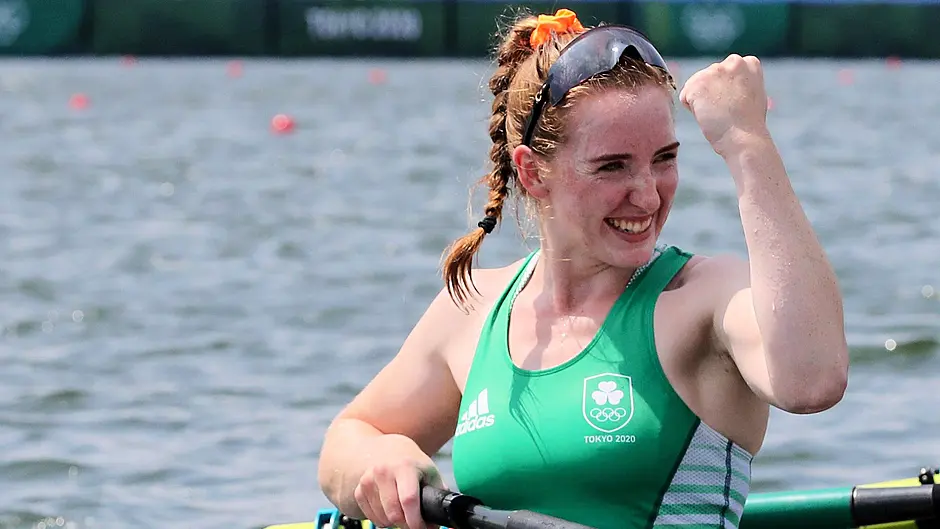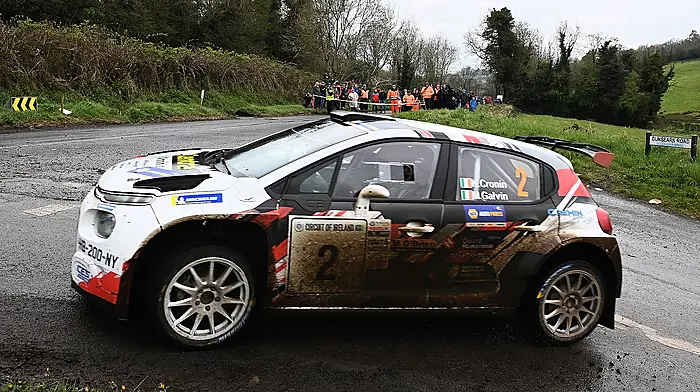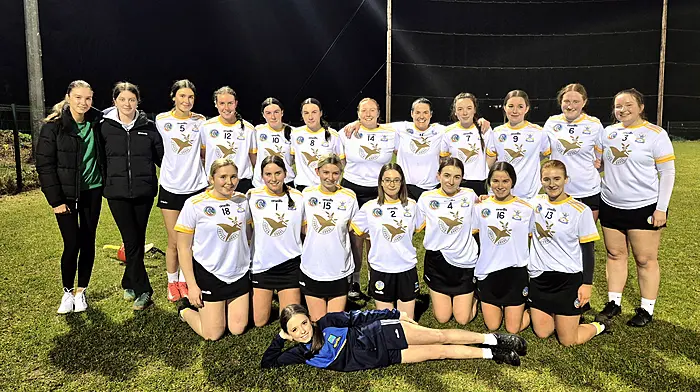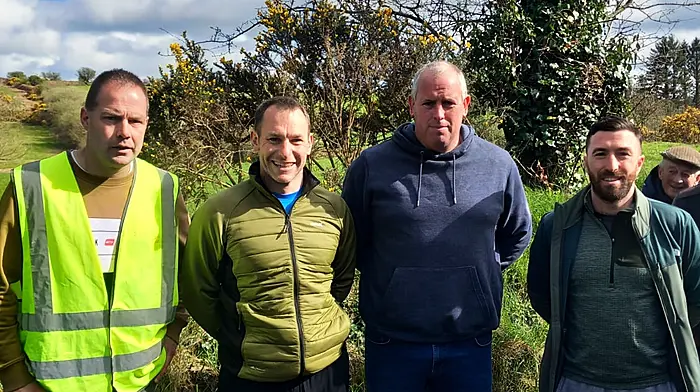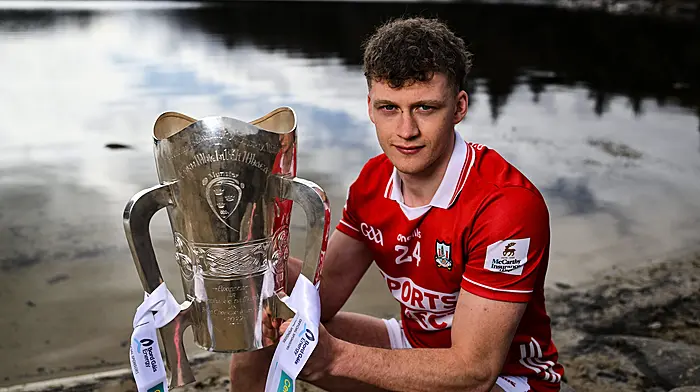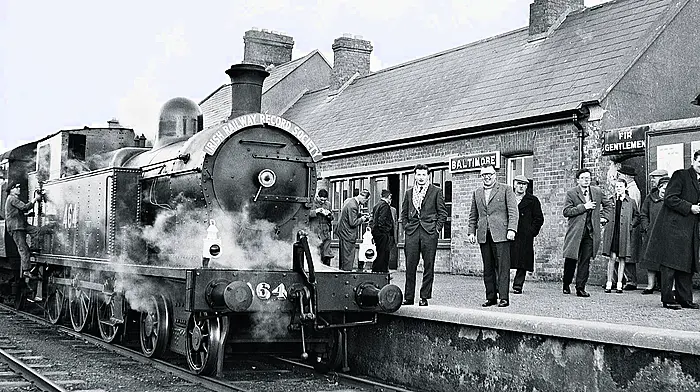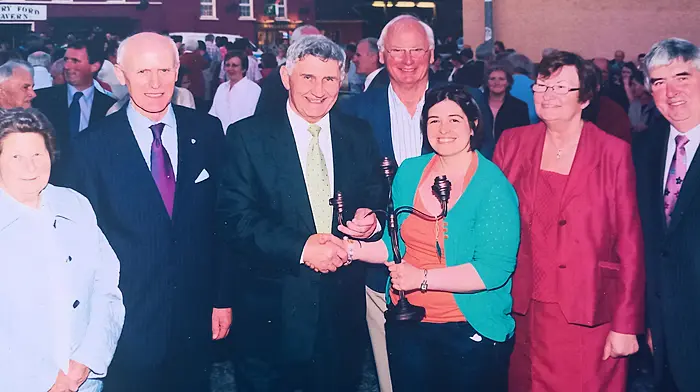Skibbereen rower EMILY HEGARTY and the Irish women’s four rowed into the history books with Ireland’s first-ever Olympic women’s rowing medal when they won brilliant bronze at the Tokyo Games. KIERAN McCARTHY relives Emily’s magical day
**********
EMILY Hegarty wrapped herself in routine on the morning of her biggest-ever race: the women’s four final at the delayed 2020 Olympic Games in Tokyo. That familiarity was a comfort blanket. Even though this was not just any other race, she approached it like it was. Routine, routine, routine. It normalised this Olympic final.
The night before – Tuesday, July 27th – she slept well on her single bed made of recyclable cardboard; it was more comfortable than it sounds. In her apartment on the seventh floor of the tower Team Ireland athletes stayed in at the Olympic Village, Emily shared a room with team-mate Aifric Keogh. The other half of this Irish dream team, Fiona Murtagh and Eimear Lambe, were in another room. More Irish rowers stayed in the same apartment, single sculler Sanita Puspure, and Ronan Byrne and Philip Doyle, the Irish men’s double.
On the eve of their Olympic final, all four – Emily, Aifric, Fiona and Eimear – packed their bags for the following day. That included packing their podium gear (white Adidas trainers, navy Team Ireland tracksuit pants and green, full-zip Team Ireland jacket) that they would need if they medalled. No Irish women had ever won an Olympic rowing medal before so if this change of clothes was called on, history would be made. The gear was handed over to the Irish rowing team’s manager Feargal O'Callaghan for safe-keeping.
Emily woke up around 6am on Wednesday, July 28th, the morning of the Olympic final that was to start at 10.50am, local time in Tokyo. That was 1.50am back home in Mohonagh in Aughadown, just outside Skibbereen town, but in Tokyo the biggest day of this 22-year-old’s rowing career was rubbing the sleep from its eyes.
Before they took the bus for the 15-minute journey from the Olympic Village to the Sea Forest Waterway, home to rowing at these Olympics, the Irish quartet made the short walk from their apartment block to the mammoth two-story Olympic Village dining hall. Emily ate the same breakfast she had all week: a bowl of Weetabix. She also picked up a coffee for the bus ride. Again, routine. The sizeable, and aromatic, Velo Coffee stock in their apartment was another piece of the jigsaw; the taste of normality. On their pre-Olympic training camp, Fiona received a delivery from Velo, and that lasted through to Tokyo. Emily brought the travel kettle and Fiona had an AeroPress coffee maker – and teamwork makes the coffee work (and taste like home).
Coffees in hand, from the dining hall, next stop: the Sea Forest Waterway and a date with destiny.
***
Emily, the youngest in the Irish women’s four, and her team-mates qualified for the Games on May 16th, just 69 days before their Olympic debuts. At the final Olympic qualification regatta in Lucerne, they surged to gold, glory and tickets to Tokyo. The previous month they had won silver at the European Rowing Championships in Varese so momentum was building – and this fab four, who had come through trials in the Rowing Ireland system earlier in the year, surged into these Games determined to make history and win a medal. In their Olympic heat on Saturday, July 24th, they finished second, only two tenths of a second behind the fancied Australian crew. Belief and confidence were high that they could position themselves in the conversation for medals, but it would all come down to 2,000 metres on the choppy and unpredictable water of the Sea Forest Waterway course.
***
It was hot and humid, again, that Wednesday morning. The heat wasn’t a surprise to the Irish four, or the largest Irish rowing team ever (six boats) sent to an Olympics. They had prepared for it.
Back home at the National Rowing Centre in Inniscarra, before the heavyweight and lightweight crews went to their respective pre-Olympic training camps, in Varese and Seville, they used a small polytunnel to begin the heat acclimatisation process. They had heaters going in there all day, topped up with bowls of steaming hot water. It was uncomfortable, but necessary. On their training camp in Italy, scorching in July as a rule, the Irish women’s four came in off the water and sat in roasting hot baths for 30 minutes. They had prepared for the Tokyo conditions so there were no surprises.
 Emily Hegarty (right) and Aifric Keogh, Eimear Lambe and Fiona Murtagh celebrate with their Olympic medals.
Emily Hegarty (right) and Aifric Keogh, Eimear Lambe and Fiona Murtagh celebrate with their Olympic medals.
Emily felt it was hotter off the water than on it. The boat park was quite industrial. The concrete soaked in and held the heat so being on the water – and it was windy, too, on the course – felt cooler than on land.
That morning at the Port of Tokyo followed a familiar routine. They went to their air-conditioned team room, topped up the sun cream, woke up their bodies with some stretching and, just before their paddle, put on their gear that had been soaking in ice-cold water. The water was choppy, as usual. Maybe a small bit bouncier. It was windy, again. This four-kilometre paddle on the course warmed up their muscles, allowed the Irish four to get a feel for the conditions – like which way the wind was blowing – and had them doing what they do better than everyone else: rowing.
In off the water, it was back to the team room, as 10.50am inched closer. Sticking to their routine, it was time for music. The crew started putting together a playlist when they were on camp in Italy before the final Olympic qualification regatta. They all chipped in with their suggestions. Their anthem, and it blared loud in Tokyo that Wednesday morning, is Let's Have A Kiki by the Scissor Sisters. They play it before every race. It’s their song.
(A quick Google tells us that a kiki is a social gathering, for chatting and sharing stories – and that feels apt for this band of trailblazing sisters, brought together from West Cork, Galway and Dublin, united in their desire to be the best on the water.)
Emily’s equivalent of the Last Supper was a small bread roll before the final. Stick to what you know on the morning of the race. Stretched and now ready to uncoil, they had their last few words with coach Giuseppe De Vita before they went back on the water.
The next time their feet touched land, their fate would be known. This is what Emily had worked towards and dreamed of. Time to go to work.
***
The view from Emily’s home in Mohonagh takes in the River Ilen. That was her playground. That’s where this middle child learned to row with Skibbereen Rowing Club, starting when she was 11 years old. Then she learned to race. And then she learned to win. Emily committed fully to rowing. It’s the sport that fits. Other sports didn’t, but rowing does. And she gave it everything.
She didn’t plan on having an 18th birthday party in August 2016 because the World Rowing Junior Championships in Rotterdam were her target. But her mom Mary and older sister Alice organised a surprise 18th birthday bash at home. Emily loved it – and she was back on the Ilen the following morning for training. Back on the water, doing what she loves. All working towards a moment like this when dreams transcend into reality.
***
The Irish women’s four warm-up ahead of the Olympic final wasn’t their smoothest. ‘Chronic’ was one description afterwards. The course was windier than it had been, a tricky tailwind was causing crews problems – and they were wary of this. They launched on the water around 10.10am. The warm-up is made up of a short paddle, then a few bursts at a higher intensity and a few practice starts before they move to the start line ten minutes before the final.
Emily, in the stroke seat, is at her most nervous waiting to go. Those seconds that linger on too long, dragging out into minutes. Time to stay focussed. Aifric in bow, Eimear in two and Fiona in three all waited, too – this was the combination that carried the hopes of a nation that stayed up through the night back home to cheer on these fantastic four.
The race plan was to stick to the routine that had taken them this far. Their start had been hit and miss, but they wanted to stay in touch with the rest of the pack for the first 500 metres, and then in the middle section push through with the fitness, strength and ability to move the boat fast. An aerobically strong crew, the second half of a race is where they come into their own – and they wanted to be in contention at the halfway point.
The Irish boat was in lane two, Great Britain was on Emily’s left in lane one. Then, to her right, it was Australia, The Netherlands, China and Poland. Three from these six would win Olympic medals. Three wouldn’t.
Ireland didn’t start well; and they would reference this afterwards as a source of frustration. They were fourth after 500 metres. Then fifth at the halfway mark, with Poland the only crew behind them. Emily could always see Great Britain to her left so she knew they were still in the hunt. And now they had their race rhythm. It was powerful, as they emptied the tank. Time to go to work.
First, they conquered China to move into fourth and, with 500 metres to go, they were only two tenths of a second off Great Britain in third. The battle for bronze was on. The Irish boat dug deep. Emily knew they had the speed and the sprint finish. Four incredible women driving towards the line, an Olympic medal and a moment of Irish sport history.
With 200 metres to go, they took third. Emily could see three boats behind them, realising then that Ireland were in a medal position. Stay clean, she thought. The water was very choppy, other crews had suffered on it, so it was crucial now not to kill the speed of the boat. Stay clean, and let’s finish this.
As Australia won gold and the Dutch four took silver, all Irish eyes were fixed on the fast-finishing four who crossed the line in third.
BRONZE!
Ireland had won its first-ever Olympic women’s rowing medal, and only second-ever Olympic rowing medal after the exploits of Gary and Paul O’Donovan in Rio in 2016. Take a bow, Emily, Aifric, Fiona and Eimear.
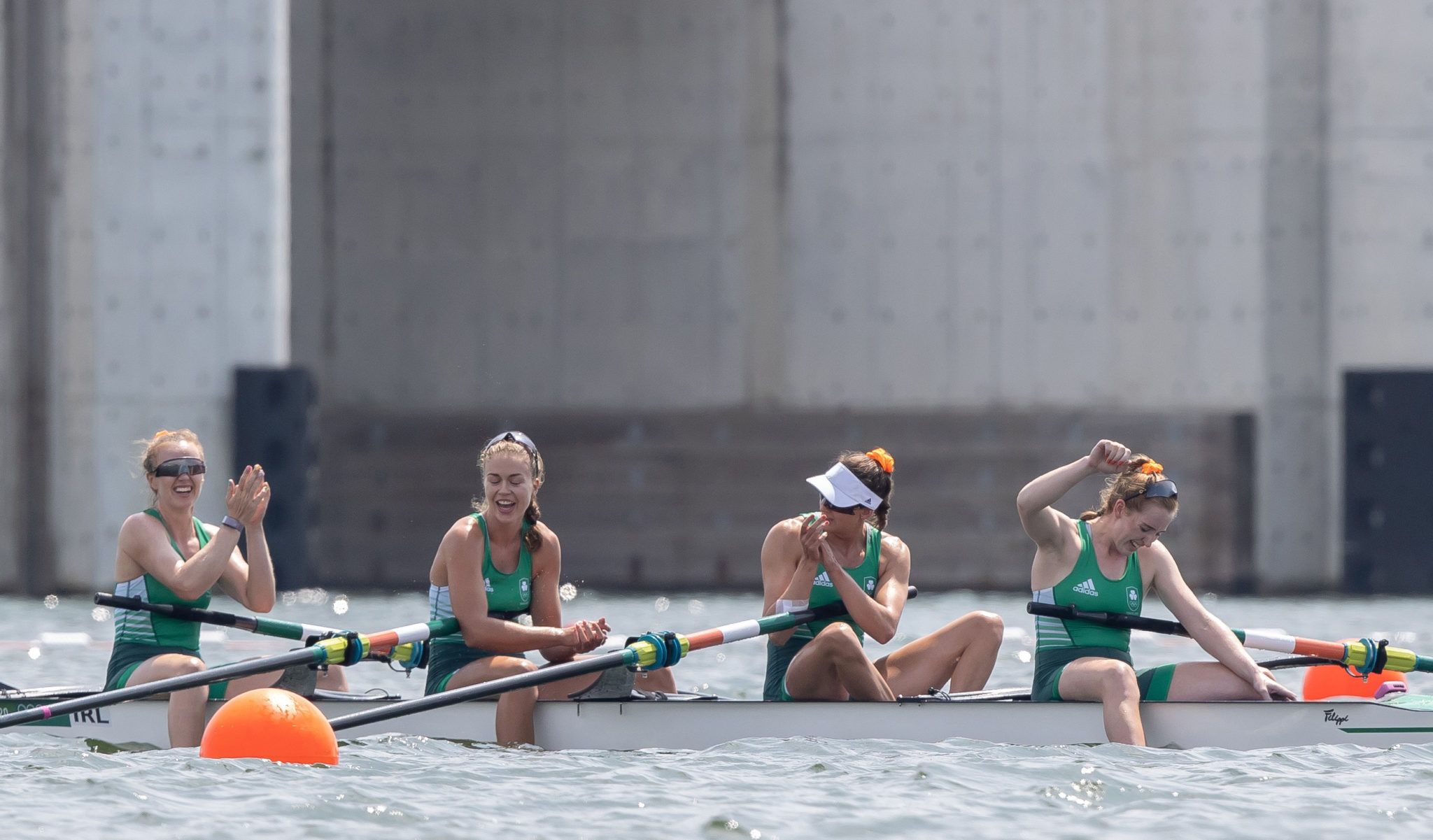 Ireland's Aifric Keogh, Eimear Lambe, Fiona Murtagh and Emily Hegarty (right) celebrate winning the bronze medal in the women's four final at the Tokyo Olympics. (Photo: Morgan Treacy/INPHO)
Ireland's Aifric Keogh, Eimear Lambe, Fiona Murtagh and Emily Hegarty (right) celebrate winning the bronze medal in the women's four final at the Tokyo Olympics. (Photo: Morgan Treacy/INPHO)
Emily’s first reaction after winning an Olympic bronze medal: relief. The first half of their race still rankles with them, it wasn’t perfect, but in the moment they celebrated their success like they should have. Together, these four had rowed onto the podium, into the hearts of the watching Irish fans and onto every front page of a national newspaper in the country. And the attention was about to go into overdrive.
***
When they came in off the water, in front of the grandstand at the Sea Forest Waterway, they shared a few magical minutes. Hugs, laughs, tears, as they celebrated with Irish rowing coaches and team-mates. Their team manager, Feargal, handed them their podium gear, and as they changed in a tent it was all quite giddy. The medal presentation was a blur.
It all moved so fast, but as the Australian national anthem was played, Emily looked down to see an Olympic bronze medal hanging around her neck, and it was her medal. She felt the emotions bubbling up inside. This was the moment Emily realised she was an Olympic medallist. This was what she had worked towards. From those first days on the River Ilen with her friends, she was now on the podium at an Olympics with three more friends. A special moment.
The next few hours were packed with interviews, though Emily missed some of the fun when she was taken for a drugs test, but she was soon back with the gang as they hopped on the bus back to the Olympic Village. Outside their apartment block, Team Ireland athletes formed a guard of honour for the four medallists. There was a buzz because this was Ireland’s first medal at these Games.
 Emily Hegarty with her Olympic bronze medal at Skibbereen Rowing Club.
Emily Hegarty with her Olympic bronze medal at Skibbereen Rowing Club.
That evening and night was action-packed: a live RTÉ interview and a trip outside the Olympic Village, Zoom interviews, catching up with home as champagne bottles popped in the early hours of a not-your-typical Irish Wednesday, and plenty of smiles, laughs and gazing at their medals.
Late that night, after a day Emily didn’t want to end, she hid her Olympic medal in a drawer in her room, having briefly contemplated wrapping it in a sock. She slept well, a content Olympic medallist.
The next morning, on her own, she popped across to the dining hall for breakfast. It was the first time in a long time she had time to herself, with her own thoughts and with time to try to process the day before. Magical. Mighty. Memorable. She ate Weetabix and left with a coffee; that routine that took her from Skibb to an Olympics and then to a famous medal.

